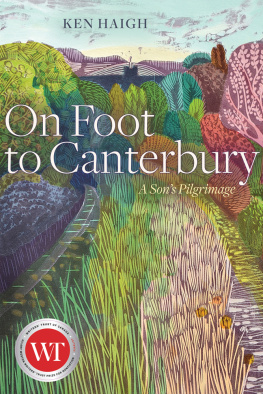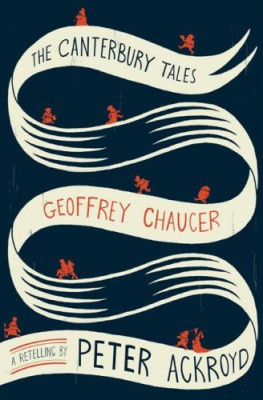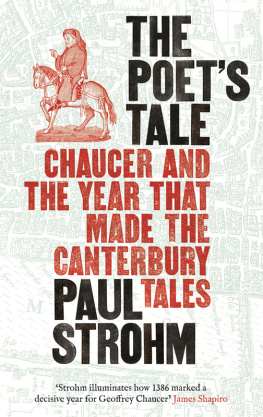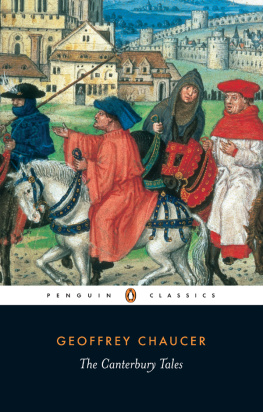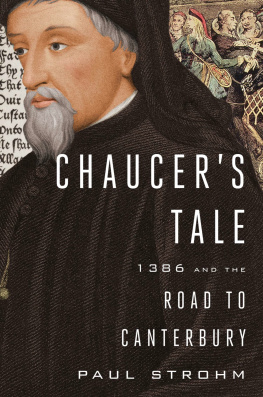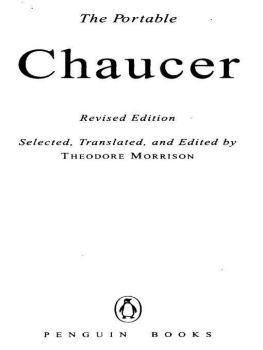Routledge Revivals
The Plowmans Tale
The Plowmans Tale
The C. 1532 and 1606 Editions of a Spurious Canterbury Tale
Mary Rhinelander McCarl
First published in 1997 by Garland Publishing, Inc.
This edition first published in 2018 by Routledge
2 Park Square, Milton Park, Abingdon, Oxon, OX14 4RN
and by Routledge
52 Vanderbilt Avenue, New York, NY 10017, USA
Routledge is an imprint of the Taylor & Francis Group, an informa business
1997 by Mary Rhinelander McCarl
All rights reserved. No part of this book may be reprinted or reproduced or utilised in any form or by any electronic, mechanical, or other means, now known or hereafter invented, including photocopying and recording, or in any information storage or retrieval system, without permission in writing from the publishers.
Publishers Note
The publisher has gone to great lengths to ensure the quality of this reprint but points out that some imperfections in the original copies may be apparent.
Disclaimer
The publisher has made every effort to trace copyright holders and welcomes correspondence from those they have been unable to contact.
A Library of Congress record exists under ISBN:
ISBN 13: 978-0-367-14587-3 (hbk)
ISBN 13: 978-0-429-03246-2 (ebk)
THE
RENAISSANCE IMAGINATION
IMPORTANT LITERARY AND THEATRICAL TEXTS FROM THE LATE MIDDLE AGES THROUGH THE SEVENTEENTH CENTURY
edited by
STEPHEN ORGEL
STANFORD UNIVERSITY
A GARLAND SERIES
THE PLOWMANS TALE
THE C. 1532 AND 1606 EDITIONS OF A SPURIOUS CANTERBURY TALE
MARY RHINELANDER McCARL
Copyright 1997 Mary Rhinelander McCarl
All rights reserved
Library of Congress Cataloging-in-Publication Data
McCarl, Mary Rhinelander.
The plowmans tale : the c. 1532 and 1606 editions of a spurious Canterbury Tale / Mary Rhinelander McCarl, [editor].
p. cm. (The Renaissance imagination)
Includes bibliographical references and index.
ISBN 0-8153-1711-5 (alk. paper)
1. Anti-clericalismEnglandPoetry. 2. Church historyMiddle Ages, 6001500Poetry. 3. Civilization, Medieval14th centuryPoetry. 4. Religious satire, English (Middle) 5. Catholic ChurchClergyPoetry. 6. LollardsSources. I. McCarl, Mary Rhinelander. II. Series: Renaissance imagination (Unnumbered) PR1898.P58 1997
821.1dc21
96-37836
Printed on acid-free, 250-year-life paper
Manufactured in the United States of America
For Henry, who never lost faith in the Pelican,
For Francesca Constance, the scholar of the new generation
and in memory of
Constance, who loved the history of Tudor England
Contents
,
Edited by William Thynne, printed by Thomas Godfray
,
Edited by Anthony Wotton,
printed by G[eorge] E[ld] for Samuel Macham and Mathew Cooke
My interest in the Plowmans Tale was first raised when I was reading seventeenth-century New England probate inventories, and was struck that Thomas Dudley, father of the Tenth Muse Anne Dudley Bradstreet, had carried a copy of Piers Plowman across the Atlantic with him. I had recently finished editing a seventeenth-century notebook of relations of conversion of the first generation of Puritans in America. I was moving outward to explore their ownership of printed books of the first half of the sixteenth century, almost a century before the Great Migration to New England.
This research was in the context of seminars in the Program of the History of the Book in America, then run by David D. Hall at Boston University. I am most grateful to him and to Hugh Amory, then of the Houghton Library, who made possible my acquisition of microfilms of the probate records of Suffolk and Middlesex counties, Massachusetts, of the seventeenth century. My project was an examination of book ownership among all classes of immigrants. Although the results of this research do not appear overtly in this edition of the Plowmans Tale, my work was stimulated by questions posed while formulating my strategies in this project.
In a sense, as well, this edition is in response to the questions posed in Wilbur K. Jordans seminar at Harvard thirty years ago. Although in those days I considered myself a medievalist, concentrating on Italy, I prepared Tudor-Stuart England as a field. I have come back again and again to ponder what makes men philanthropic, and how have the objects of philanthropy changed over time. This, of course, is key to the understanding of the Lollards as well as the early Protestants.
Beginning fifteen years ago, I became a professional librarian and archivist, specializing in the arrangement and description of book and manuscript collections. For the last six years I have been an independent scholar, working in the field of printing history. I am most grateful to Harold F. Worthley, of the Congregational Library in Boston, who gave me my first job as a librarian and taught me to appreciate the seventeenth-century Puritans. Many old friends at the New England Historic Genealogical Society have encouraged me over the years, especially Ralph J. Crandall and Nathaniel N. Shipton.
The collections of the Houghton Library at Harvard were key to the research for this edition. The material that had been assembled there for the second edition of the Short-Title Catalogue, both sixteenth-century editions and reference materials, gave me an unprecedented base on which to work out some tentative answers to questions of the printing history of the 1533 edition. Hugh Amory made it possible for me to consult the scrapbooks of photocopies of historiated initials assembled by F.S. Ferguson and Katharine F. Pantzer. I was able to examine sixteenth-century volumes printed by Thomas Godfray and his contemporaries at the Folger Library as well. Members of the staff of the Huntington Library, the owner of the unique copy of the 1533 edition, answered my long distance questions. I have yet to examine the book personally.
The Humanities Research Center at the University of Texas provided a microfilm of the only manuscript of the Plowmans Tale, probably prepared to be bound into the 1532 edition of Chaucers Works. Laetitia Yeandle of the Folger helped me date the manuscript and the staff of the Rare Book Collection of the Harvard Law Library helped me narrow down the specialized legal handwriting.
The audience of a presentation on the edition, participants at the meeting William Tyndale: Church, State and Word at the Catholic University of America and at the Folger, July 1994, had very helpful comments. Early papers on some of the issues raised by printing and owning medieval works in a Puritan context were given at the 1991, 1992 and 1993 meetings of the Southeastern Medieval Association.
Above all, I and independent scholars like me, without research funding or a secure base, have to be grateful for the enormous effort that has gone into microfilming pre-1640 books printed in the English-speaking world. Without this resource, the project would never have been to a conclusion. The staff, particularly Tinker Dunbar and Eddie Luster, of the Interlibrary Loan Department of the University of Alabama at Birmingham, worked diligently to procure rolls of film and books for me.


